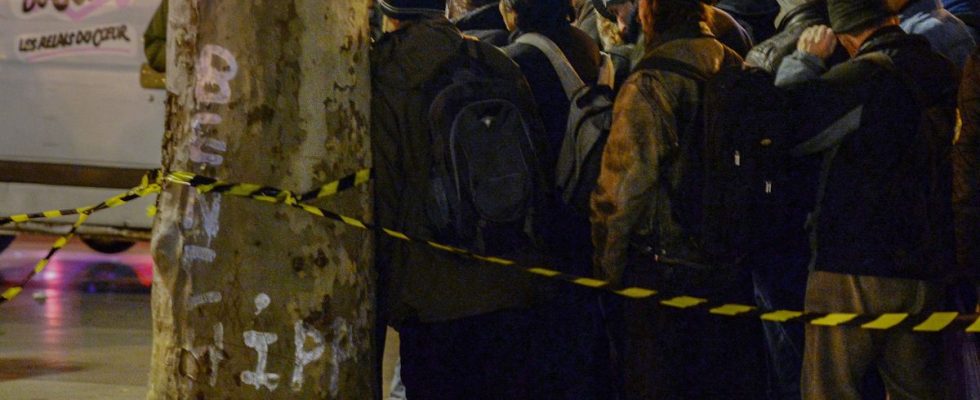“It’s not really my fault that some of them are hungry. But it would become so if we changed nothing about it, ”said Coluche. Since 1985, the Restos du Coeur have worked tirelessly to change things. But “this monument is in danger”, assures the association created by the comedian. While they provide 35% of food aid in France, the Restos du Coeur are seeing food prices explode and queues lengthen in all their centers.
“We served 142 million meals last year and here we are at more than 170 million meals. It’s unprecedented. In the centres, the volunteers see it: we have never experienced such a situation”, explains the association. She “can no longer respond” and announced that she had to reduce the number of her beneficiaries. The Minister of Solidarity, Aurore Bergé, immediately announced a plan of 15 million euros. Of this sum, 10 million euros were however already planned, specifies the association.
The scars of Covid-19
The despair of the biggest player in food aid in France is shared by other associations. The Secours populaire notes an increase in demand of “20 to 40% depending on the territory” and the Salvation Army has “virtually doubled” its food aid compared to before the pandemic. Because the Covid-19 has been there and the virus continues to undermine the finances of the French. “Food insecurity has been increasing since the early 1980s, but Covid-19 has had long-term effects. Many people have been impoverished and now find themselves asking for food aid because they no longer have a choice. It’s a delayed process”, analyzes Axelle Brodiez Dolino, research director at the CNRS, specialist in poverty issues.
Some households have, in fact, been forced to dip into their savings during the pandemic. However, “the people who have the lowest budgets no longer have any reserves”, notes Anne Brunner, director of studies at the Observatory of Inequalities, who recalls that “the richest 20% put on average 30% of their income aside per month and can therefore dip into their reserves in times of crisis”. After the pandemic where unemployment peaked and many companies – small or large – found themselves crippled with debt, another phenomenon made its way to the already well-worn wallets of the French: inflation.
The ax of inflation
“These are very different but linked effects. People have been scratching the bottoms of drawers for a long time and the inflation crisis is particularly violent! “, describes Axelle Brodiez Dolino. “People who turn to food aid are in dire poverty. They have no more resources while the prices do not stop increasing, ”explains the member of the National Council for the Fight against Exclusion. “There has been no explosion of poverty despite the health crisis”, tempers Anne Brunner, who adds that around 8% of the population lives below the poverty line, set at 940 euros per month, since the last ten years.
A week of purchase represents 5 million euros today, whereas it was 2.5 million euros last December! »
“However, we do not yet measure the impact of inflation because there is always a delay between the time when income is declared and the time when INSEE produces data,” she underlines. Especially since the social minimums and the Smic follow the average inflation (4.8% in August), much less galloping than that of foodstuffs (11.1%). However, “food weighs more heavily in the basket of the poorest than in that of other households”, emphasizes Anne Brunner. For associations that distribute meals, it’s a double penalty. The Restos du Coeur note that the donors are “always there”. However, the association itself buys a third of the products distributed. “A week of purchase represents 5 million euros today, whereas it was 2.5 million euros last December! », warns the association.
The half-full plate
However, some indicators are positive. Inflation is slowing down (gently) and, above all, unemployment is falling. In the second quarter, it stood at 7.2% of the active population in France (excluding Mayotte), according to calculations by the International Labor Office (ILO), according to INSEE. “The fall in unemployment should lead to a decline in poverty” but “these two phenomena, inflation which affects the most modest on the one hand, the fall in unemployment which improves the incomes of young people and the least qualified on the other part, are paradoxical”, analyzes Anne Brunner. While waiting to see more clearly, the observation is final. Today, many people can no longer feed themselves without help in France, while France is the third country in the world to host the largest number of millionaire residents.
“This inequality is increasingly being discussed. In France, there is no right to food, whereas a right to housing and a right to health have been created,” recalls Axelle Brodiez Dolino. Food aid relies mainly on associations, volunteers and donations. This Monday, the family of Bernard Arnault, owner of LVMH, announced to pay aid of 10 million euros to the association. In its press release, the family slips, however, that the Restos du Coeur, “a magnificent association of general interest”, is still “looking for additional funds to finalize its annual budget”. What to give a respite to a “monument in danger”, which could have to close its doors to 150,000 people in need as of November, if nothing changes.

